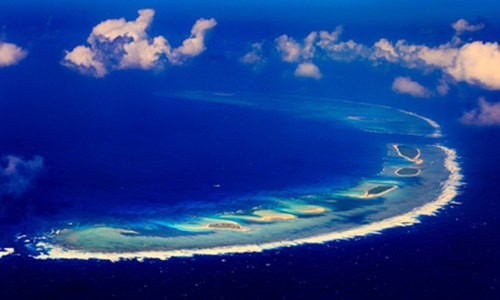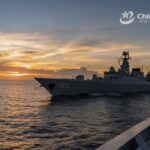While China is working with ASEAN members to advance consultations on a Code of Conduct (COC) in the South China Sea and has made visible progress, the US has been flexing its muscles in the region with despicable moves aimed at sowing discord between China and ASEAN members and undermining the hard-won stability in the region, Chinese analysts said, following the US State Department’s latest statement on the South China Sea.
The US is the largest manipulator, and its actions have posed the biggest threat to peace and stability in the South China Sea, Chinese analysts noted.
Analysts warned that the US will stir up more troubles, incite more confrontations in the region and engage in more radical and dangerous moves in stirring up military conflicts with China, and the Chinese People’s Liberation Army (PLA) has been preparing for conflicts in the South China Sea and across the Taiwan Straits through military drills to improve its combat capability and information construction.
In a statement released on Monday, US Secretary of State Mike Pompeo said that most of China’s maritime claims in the South China Sea are “completely unlawful,” and he accused China of “bullying” Southeast Asian countries.
“The world will not allow Beijing to treat the South China Sea as its maritime empire,” Pompeo said in the statement.
In response, the Chinese Embassy in the US said China is firmly opposed to the US State Department’s statement, which deliberately distorted facts, exaggerated the situation in the region and attempted to sow discord between China and other littoral countries.
Zhuang Guotu, head of Xiamen University’s Southeast Asian Studies Center, told the Global Times on Tuesday that Pompeo’s latest statement on the South China Sea was not surprising, and that he was playing his old tricks, as the US State Department issued a similar statement a year ago which called China’s South China Sea claims “unlawful,” and accused China of using maritime militia to “intimidate, coerce, and threaten other nations.”
“The US government has been focusing on the South China Sea, as it believes the South China Sea issue is their best card to contain China while the trade issue is unlikely to make China yield to pressure in a short time,” Zhuang said.
China has sovereignty and jurisdiction over the South China Sea in accordance with international law, including the United Nations Convention on the Law of the Sea, and China also has historical rights in the South China Sea.
The Arbitral Tribunal’s decision in 2016 mentioned by Pompeo is illegal, is not recognized by China, and does not affect China’s historical rights over the South China Sea, Zhuang said.
By mentioning the Arbitral Tribunal’s decision, Pompeo aimed to form a common position for ASEAN members on this issue, and wheedle them into being part of its so-called global alliance in the Asia-Pacific region to target China, Song Zhongping, a Chinese military expert and commentator, told the Global Times on Tuesday.
Experts warned that ASEAN members should not fall into the US’ trap, and they pointed that the US is the largest manipulator and threat to the region’s stability.
The situation of the South China Sea has been improving in the past years. China and other littoral countries have maintained dialogue and communication through consultation mechanisms on maritime affairs.
The COC consultations are proceeding smoothly and speedily, with the second reading of the text already under way, and China and ASEAN members have agreed to conclude the COC at an early date, Chinese State Councilor and Foreign Minister Wang Yi said on the sidelines of the 13th National People’s Congress on May 25.
No external interference can distract or sabotage our efforts, Wang said, adding that although COVID-19 has put the consultations on a break, China is coordinating closely with ASEAN members to pick up where we left off as soon as possible.
Shortly after Wang’s remarks, China and ASEAN members held a senior officials’ video conference on July 1, during which senior officials agreed to further advance the COC consultations, according to the Chinese Foreign Ministry.
The US is likely to use Pompeo’s latest statement as a prelude to inciting more confrontations, and sabotage the COC before the US presidential elections in November to undermine the hard-won stable situation in the South China Sea, analysts said.
China should spare no effort to advance a rules-based maritime order in the region, and the PLA needs to prepare for possible military confrontations stirred up by the US in both the South China Sea and across the Taiwan Straits, Song said.
But the South China Sea is well within the grasp of the PLA through effective strategic weapons, as China’s generations of intercontinental ballistic missiles can fully cover the entire South China Sea region, Zhuang said.
Xisha Islands in the South China Sea Photo: VCG



